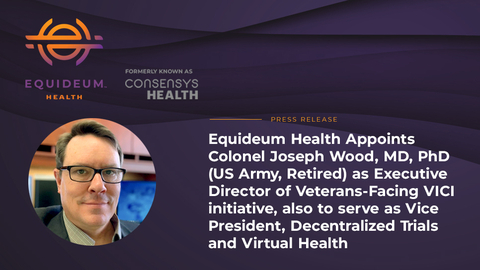WASHINGTON– Today, Equideum Health (formerly ConsenSys Health), a ConsenSys partner and Mesh portfolio company creating Web3 person-centered healthcare and research networks, announced that it has appointed Colonel Joseph Wood, MD, PhD, USA (Ret.) as Executive Director of the VICI (Veterans Incentivized Coordination and Integration) initiative, a collaboration with Dixon Center for Military and Veterans Services backed by Global Blockchain Ventures, which focuses on improving veterans’ health. Dr. Wood will also serve as the company’s Vice President, Decentralized Trials and Virtual Health. In these new positions, Dr. Wood will draw upon his extensive medical, clinical research, and regulatory experience in the United States military and in civilian practice in addition to his long-standing interest in applying transformative technologies, such as telemedicine and blockchain, to address healthcare challenges.
Dr. Wood spent 30 years as an officer in the US Army in both active duty and national guard roles. Additionally, he worked as a Department of the Army Civilian at Dwight D. Eisenhower Army Medical Center, Ft. Gordon, GA. He most recently served as Chief Medical Officer, Virtual Health for the Army’s Regional Medical Command-Atlantic Region (RHC-A). In that role he was responsible for the oversight and development of Virtual Health clinical services throughout RHC-A.
His previous positions included appointments as the Chief of Telehealth Services at Dwight D. Eisenhower Army Medical Center where he established the center’s first multi-specialty telemedicine services department and as the Chief Medical Information Officer and the Chief of Clinical Investigation Department with oversight of research facilities and regulatory oversight for research performed at Army facilities in the Southeastern United States. In this latter role, he was also the Principal Investigator and Program Manager for the development and management of the Defense Medical Research Network and the first electronic Institutional Review Board IT system deployed across the Department of Defense (DoD) military health system.
During Operation Iraqi Freedom in 2004/2005, Dr. Wood was the Chief of Clinical Operations for the Multinational Corps in Baghdad where he was responsible for reviewing, recommending, and establishing clinical policies, guidance, plans and standards in support of 135,000 coalition soldiers in Iraq. Also in this role, he established new clinical databases and provided analysis for better forecasting of medical support needs and trends in battle injuries across the theater of operations.
Also holding a PhD in endocrinology research, Dr. Wood, who retired from the military in 2015, is board certified in Internal Medicine and Endocrinology, Diabetes and Metabolism. He is a Fellow of the American College of Physicians and the American Association of Clinical Endocrinologists. Using a variety of modalities, his clinical practices have implemented both traditional clinic settings and virtual health to reach even the most remote patients. Dr. Wood has received multiple DoD research grants in the areas of digital health, digital therapeutics, telehealth, and military operational medicine. He has published more than 60 articles and abstracts.
At Equideum Health, Dr. Wood will lead the company’s initiatives to deliver privacy-preserving decentralized clinical trials capabilities as an element of the company’s forthcoming Data Integrity and Learning Networks (DILNs) and their various implementations. VICI is a DILN that is focused on the wellbeing of veterans, and Health Utility Grids (HUGs) are geographically defined, municipally scaled networks that focus on underserved and other specific populations.
DILNs will initially address chronic pain points associated with clinical trials matching, which often fail to recruit requisite numbers of qualified trial subjects in a timely fashion. As a founding member of the Decentralized Trials & Research Alliance (DTRA), Equideum Health has a particular focus on developing tools to enhance and harness the value of decentralized clinical trials.
“It is impossible to imagine a more qualified individual than Dr. Wood for these key leadership positions at Equideum Health, particularly as we advance innovations such as decentralized trials, adaptive trials, pragmatic trials, and what we refer to as Real-Time Real-World Evidence (RT-RWE)TM” says Heather Leigh Flannery, Founder & CEO of Equideum Health. “I am thrilled to welcome Dr. Wood to our world-class leadership team and have full confidence he will truly make a difference for the communities our DILNs will serve, beginning with the VICI DILN.”
Dr. Wood will leverage his deep experience in clinical research and its associated regulatory complexity to implement accelerated matching processes based on a decentralized approach, built on top of the company’s Elevated ComputeTM platform, which incorporates privacy-preserving Ice Lake-generation SGX technology from Intel within Microsoft Azure Confidential Computing. By introducing self-sovereign data and fine-grained consents for its sharing and usage, clinical trials can readily scale beyond the geographic boundaries of individual hospital systems.
“It is a great honor to work with the innovative team under the visionary leadership of Ms. Flannery. As a multigenerational military veteran whose family members served the nation in every conflict dating back to the war of 1812, I’m inspired to be in a position to help improve veterans’ health and access to care through the VICI initiative. Applying new technologies developed by Equideum Health to the clinical trials space will rapidly accelerate lifesaving treatments in ways that have not been possible in the past,” says Dr. Wood.
In his leadership position for VICI, Dr. Wood will translate his first-hand knowledge of the health needs of service members and their dependents to the uniquely complex needs of veterans, their families, and caregivers. His big picture understanding of the major health and wellness issues facing veterans and empathy for their privacy in personal health will inform the operational model for VICI. These attributes, combined with robust assessment of health outcomes, will ensure the program truly improves outcomes for individuals.



